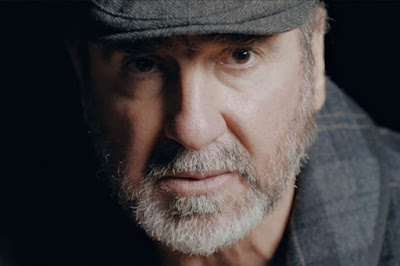City may have won the league - and may yet win the Champions League - but it's Manchester United who remain undefeated kings of branding, as the emergence of two films at the end of a relatively undistinguished campaign attests. Next week sees the release of Alex Ferguson: Never Give In, a biographical account of either the club's greatest or second greatest manager, directed by its subject's son; this week, we get The United Way, a very selective survey of post-War Old Trafford life, produced by ITV Sport figurehead Matthew Lorenzo, narrated by Eric Cantona (who also takes a script credit), and featuring exclusive interviews with varyingly prominent former players, from Brian Kidd through Arthur Albiston and Kevin Moran to David Beckham and, er, Ryan Giggs. I say selective, because the film, directed by Mat Hodgson, is really only interested in two teams, and then maybe only in one of those: the Busby Babes, first seen being stalked round the training ground by a young (and yet still somehow old-seeming) Frank Bough, and the shining Class of '92, which is where Becks and Giggsy come in, weaving their on-pitch magic to the strains of "I Am the Resurrection". What fell in between these two distinct eras has been tamped down into mere second-act struggle, and in the case of the Docherty and Atkinson years, revisited as a joke, very much not the United way. Shrug off the years of discontent, and polish the silverware: this may be not just the United way, but the way of all brands.
As extended corporate promotional videos go, The United Way is at least semi-watchable. It doesn't deviate notably from the proven footy-doc formula of highlights from The Big Match interspersed with talking heads recruited to ring similarly nostalgic bells, but I was struck by the range of those talking heads. Someone, whether Hodgson or Lorenzo, has a contacts book big enough to encompass erstwhile players, managers and executives, an attendant who survived British European Airways Flight 609, professional Mancunians (Andy Burnham, Shaun Ryder and Bez, Peter Hook) and - here to discuss the dereliction of the industrial North by the turn of the 1980s - Neil Kinnock and Michael Heseltine. More from all of these would have been welcome; as it is, the film becomes increasingly unbalanced by the psychodrama around Cantona's arrival and departure, reducing even old Golden Balls himself to playing second fiddle. Practically the one stylistic choice Hodgson makes - and this, I suspect, may have been Covid-enforced - is to sit Eric down in a darkened room, from where he sporadically mutters to camera, like a god removed of his dominion. Of course, the film makes a big deal of That Fateful Night at Selhurst Park: strangely, the film forsakes the video evidence in favour of photographic stills that don't quite do justice to the full explosion of retributive rage. Yet that means we're tied to the Nineties for almost the entirety of the second half, with no Ferguson on hand to cut through the emblandishments, and no-one daring to confess what it was really like to be on the receiving end of the hairdryer treatment. Fans of a certain age will likely be happy enough: they'll see more victories in this 90 minutes plus extra time than they have all season, and Hodgson does their blood pressure a favour by stopping before the Glazers enter the frame. That, too, is a conscious omission, though, and one typical of yet another recent British pop-cultural artefact that would rather revisit past glories than ask difficult questions. Editorially, The United Way needed a little less Brasso and a lot more Deep Heat - but then isn't that true of most topflight football nowadays?
The United Way opens tonight at the Manchester Everyman, before screening on Sky Documentaries this Monday at 9pm; it is also now available on DVD.

No comments:
Post a Comment